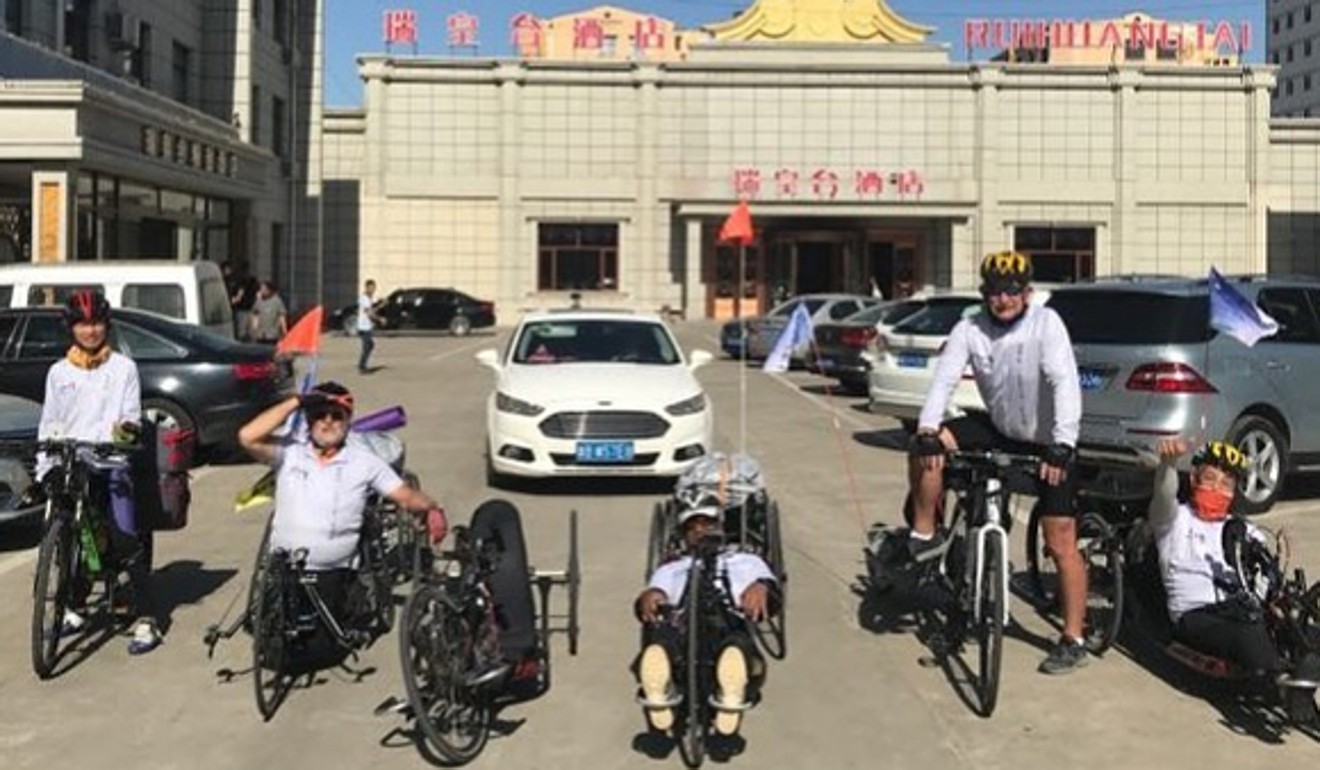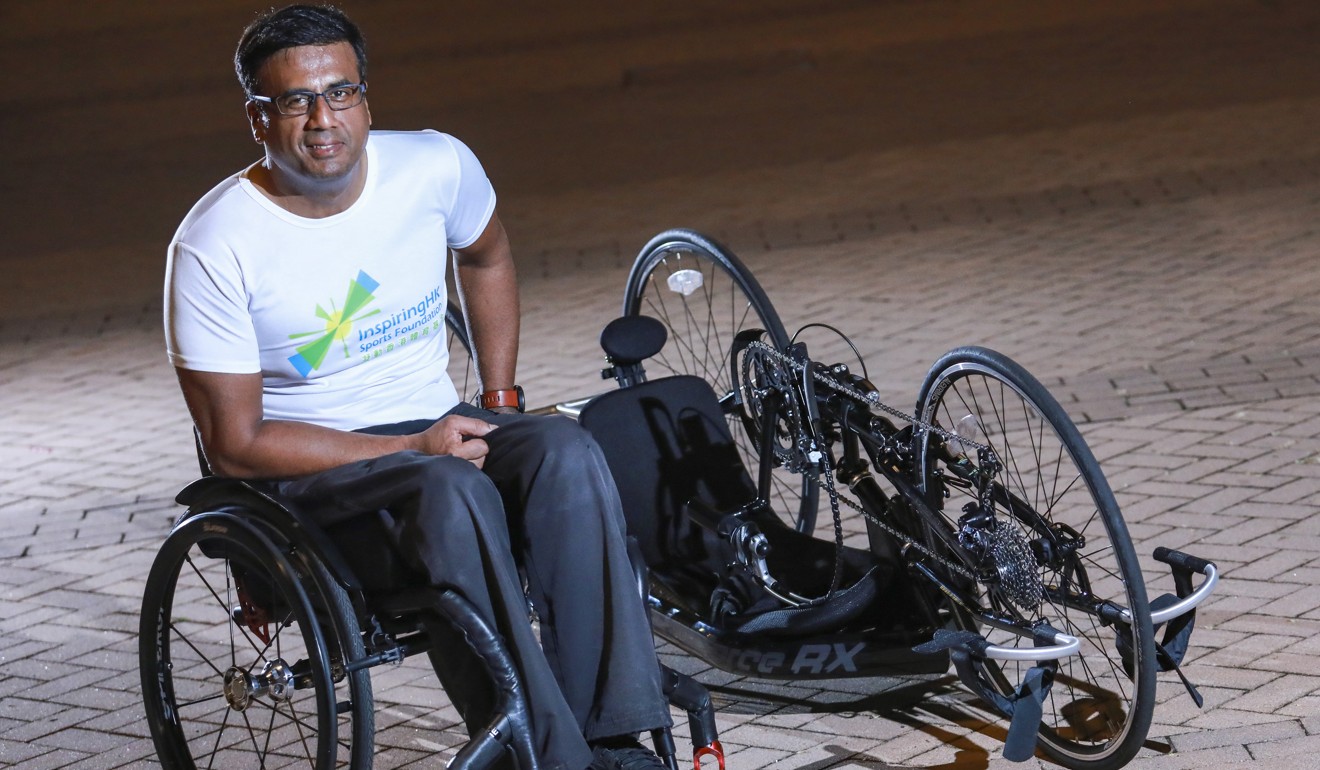
Pakistani former pilot fights back from the brink to inspire fellow disabled people in hand-bike ride across in China
- Ajmal Samuel’s life was so rocked by a car accident he attempted suicide in 1988
- Having moved to Hong Kong in the early 90s, he has built a strong business career, with sports as his driving force
A year after being paralysed in a car accident, former military pilot Ajmal Samuel in 1988 injected himself with an overdose of opiate and cocaine, hoping to never wake up again.
Aged 23, the Pakistani soldier was in the middle of 15 operations within two years. The chronic pain from his injured nerves felt like “somebody jabbing a knife into my legs”.
“That was a dark time in my life. It just occurred to me that I’m not a hero, [or] invincible,” recalls Samuel, who was stationed in Kashmir when the accident led to a permanent spinal cord injury. “It came to the point that I decided: enough of this agony.”
He has no idea how he survived, but Samuel woke the next morning and began a brand-new journey in search of ways to control the pain.
People who make Hong Kong proud honoured in third Spirit of Hong Kong awards
He recalls thinking: “It seems nothing’s going to destroy me. I need to move on and take control of my life.”
Now 53, he believes he finally found the fix: “replacing painkillers with endorphins” by taking part in sports.
After moving to Hong Kong in 1991, Samuel became a proactive athlete and prominent entrepreneur. From 2004, he joined dozens of competitions in rowing, marathon, triathlon and other sports.

Now he is on a mission to hand-bike from Beijing to five other cities in northern China with a mainland Chinese charity group, to raise awareness about spinal cord injuries.
Organised by Krankin’ Thru China – which sets up hand-biking rides through the country to empower and inspire disabled people to take up sport – the trek will cover about 2,500km in less than 40 days, and started on Tuesday. Along with six teammates from mainland China, the United States and Australia, Samuel will hold workshops to promote sports at town centres and the team will be joined by local cycling groups.
My skin colour was wrong; I couldn’t speak Cantonese; I was in a wheelchair. It was just all wrong
Several funds have been set up in honour of their efforts, including one in Hong Kong started by the InspiringHK Sports Foundation, which offers sports training to young people from low-income backgrounds.
Statistics from the China Disabled Persons’ Federation showed there were more than 34 million people with disabilities in mainland China in 2017, accounting for about 2.4 per cent of the total population. According to the same organisation, 12.9 per cent took part in some kind of sport last year.

In Hong Kong, 578,600 people, or 8.1 per cent of the population, were diagnosed with disabilities, according to government data from 2013.
Describing himself as “a big believer in sports”, Samuel says that, before the accident, he used to excel at long-distance running and horse riding as a young military officer. “I joined the army at 16, because my dream was to become a pilot. I was doing whatever I wanted to do, everything was perfect,” he says.
After surviving all the surgery, and the attempt on his own life, he got a bachelor’s degree in computer science from a German university in 1989. Two years later he visited his parents, who were temporarily based in Hong Kong as missionaries, and immediately “fell in love” with the city’s vibrant social life.
“Hong Kong is a very happening and hustling place, and I thought: this is my type of city,” he recalls.
But it was not always the easiest place to live as a disabled migrant.
It was like torturing myself at first, knowing that the pain would disappear when endorphins kick in
“My skin colour was wrong; I couldn’t speak Cantonese; I was in a wheelchair. It was just all wrong,” Samuel says, citing the times he was refused by taxi drivers and restaurant workers, as well as for most of the jobs he applied for.
But Samuel stayed in the city and rose from being a computer technician at a network service company to being an executive at several technology companies. He established OCTO3 Group Holdings, a financial technology firm which now has a presence in Thailand, Singapore and Pakistan.
Sports began to play an irreplaceable role when Samuel found it helped him cut back on painkillers, which were jeopardising his ability to think quickly.
Samuel says hand-cycling – which uses a specially designed bike, powered by the rider’s arms rather than their legs – was the first sport he chose to get into after being paralysed. He started in 2001, when he was CEO of Cityline Hong Kong, practising for three hours before and after work every day, while gradually reducing the amount of opioid painkillers he consumed.

“Whenever I had withdrawal symptoms, I would go training. It was like torturing myself at first, knowing that the pain would disappear when endorphins kick in,” says Samuel, who freed himself from the drugs within three months.
He says the sport “allows me to have freedom to go anywhere, and with other people in a social group. It gives me a different kind of confidence.”
“AJ can be kind of crazy,” says his rowing coach Brian Yau Tsz-fung, using his nickname for Samuel. “When we first met in 2011, he would say yes to whatever goals I set, and go through the training regardless of his conditions. It’s only later he would talk about the pain.”
Yau Chi Choi Daniel, who is on a rowing team with Samuel, describes him as “a man with determination and fighting spirit”.
“When the whole team felt frustrated, he would boost morale by sharing his recovery experiences,” says Yau, who suffers from polio. “That really inspired me.”
Among all these experiences, the most memorable for Samuel was the very first competition he took part in as a disabled athlete – a small hand-cycling championship in Kunming, Yunnan Province in 2004.
“I stood at the starting line, and thought: now I’ve come all the way from almost killing myself to actually competing,” he recalls. “It was so gratifying.”

